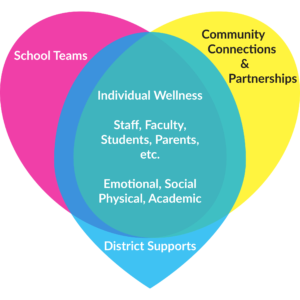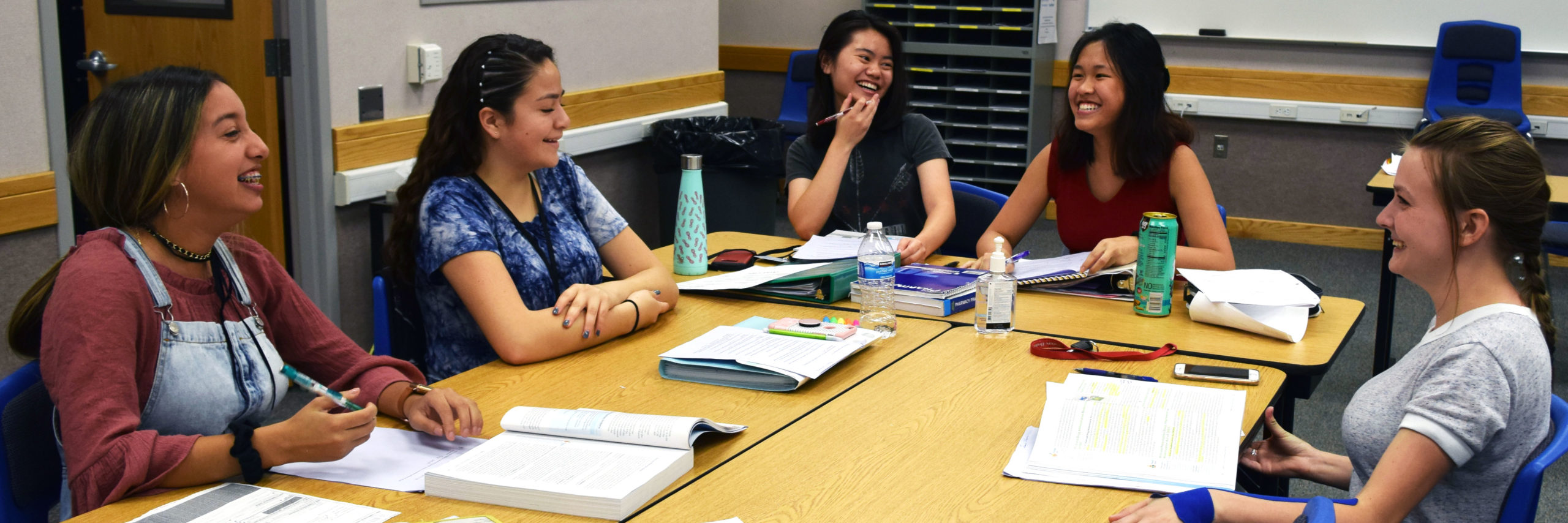Jordan District's Approach to Wellness
When asked "what do you want most for your children, grandchildren, nieces, and nephews?" words like "happiness, love, satisfaction, and wellbeing" are typical responses. At Jordan School District we consider student wellbeing a top priority.

Our approach to wellbeing is centered on building caring relationships and positive connections. Research on health and wellbeing has made it very clear that relationships are an essential part of wellness. Jordan District's proactive approach to health and wellness is represented by the image seen to the right where three components come together to promote individual wellness: school teams, community connections & partnerships, and district supports. This diagram is in the shape of a heart as a symbol of the importance of caring relationships and positive connections. We hope that every community member, student, faculty & staff member, and parent can work together to promote positive relationships and individual wellness.
Understanding human wellbeing is both simple and complex. It is simple in that the little things we do make a huge difference to our wellbeing: getting enough sleep, getting regular exercise, building strong relationships with friends and family, engaging in meaningful activities, taking time to do things you enjoy, and the list of tips and tricks goes on and on with HUNDREDS of books published on the topic of human happiness and wellbeing. While these simple actions do truly make a difference, our health and wellbeing is still extremely complex and individual.
All the research on wellbeing does point to one important truth: we can make choices that will help us live happier, more fulfilling lives.
Evidence-Based Happiness
Most of the research on happiness comes from a scientific community called "positive psychology." Some of the leaders in this field of research have created websites and blogs that can be very helpful in understanding the actual science of happiness. Here are a few links if you'd like to learn more.
- More Happy Life was founded by a friend of Jordan District whose ideas and resources are fantastic
- The Positive Psychology Center from UPENN
- Positive Education Schools Association, to which Jordan District has a membership
- There is also a fantastic blog and other resources at positivepsychology.com
There are also two courses that individuals can take for FREE online that were created by some of the leaders in positive psychology.
- Yale's most popular class on happiness, "The Science of Well-Being" is offered free online
- The founder of positive psychology has also offered a course for free called "Foundations of Positive Psychology"
There are also hundreds of books and podcasts that are based on research from positive psychology. If you'd like some ideas, contact McKinley Withers in Jordan District.
Where do I start to become happier?
One of the most common strategies for improving wellness comes from a simple framework called PERMA. This is an acronym that represents five components that contribute to happiness, each of these are defined below. To help introduce the idea of PERMA we will share a strategy that would help you improve in this category. Happiness is dependent on many pieces fitting together.
Positive Emotion
- Try a practice of gratitude to increase positive emotions, this could be letters to others, a daily journal, or ritual of prayer
- Exercise or meditation can also increase our experience of positive emotions
Engagement
- Working on something that you enjoy like a new skill/hobby (art, sports, outdoors)
Relationships
- There are many skills that help us improve our relationships, the first step to improving them is recognizing that they are absolutely the most important thing in our lives. Investing time and energy into making our relationships better will change our lives for the better.
Meaning
- Tying your actions to your life's purpose. We all have something unique and meaningful to contribute, keep working towards that!
- Try donating time or money to an important cause, giving is one of the best ways to add meaning to your life.
Accomplishment
- Goal setting and following through. Several Wellness Wednesday posts that offer tips for keeping our goals.
An example of PERMA applied
Here is another way of working on PERMA - you could start ONE new behavior that would affect each of these aspects of your life. An example of this would be a routine of exercise. Here is how it would apply to each of the elements of PERMA.
- Positive emotion: stress reduction from the release of endorphins from exercise
- Engagement: becoming absorbed in the new routine through focus
- Relationships: finding new friends that share your exercise routine and having something productive to do together
- Meaning: finding a deeper reason to exercise “I exercise because I just want to live long enough to see my child graduate”
- Accomplishment: meeting your new exercise goals and setting more
The little things matter - sleep, diet, and exercise
Our bodies are complex organisms and what we do with our daily practices make a big difference to our wellbeing. Check out these articles that have further information on how small changes to your sleep, diet, and exercise will help you live a happier, healthier life.
Another simple list of happiness tips
- We can control more of our happiness than we think – there is something you can do!
- Our circumstances don’t matter as much as we think
- You can become happier but it takes work & daily effort
- Knowing isn’t enough – PRACTICE matters
- Your mind is lying to you a lot of the time – our happiness forecasts are most often wrong – your mind lies to you about what will make you happy (salary experiment)
- Make time for social connections
- Make time for gratitude every day
- Healthy practices matter more than you think – sleep, diet, & exercise habits
- Become wealthy in time not money

